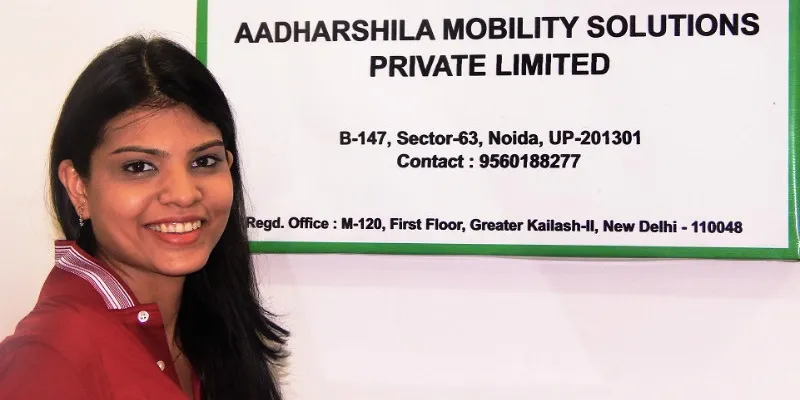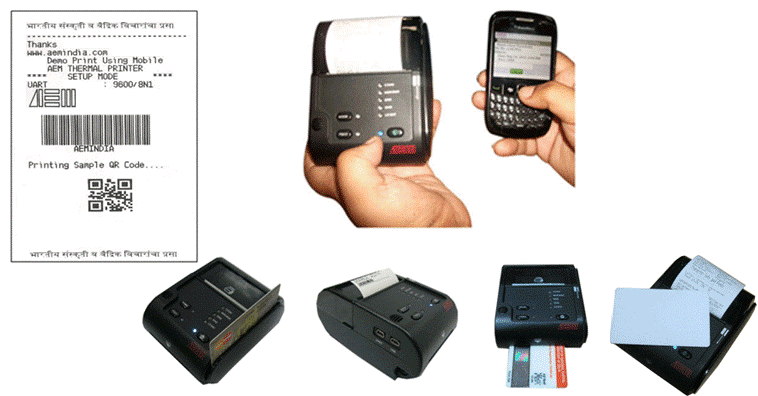Aadharshila hopes to revolutionise wireless handheld billing in India with their portable printers
Aadharshila is a Noida-based startup that has launched an innovative set of wireless handheld billing solutions to enhance the speed and reliability of mobile points of sale. Founded by Kavita Aggarwal, an electronics engineer, Aadharshila Mobility Solutions was formally launched in March 2015, with a young and dynamic team of 10, comprising engineers, marketing, and customer-support personnel.
Kavita says,
Our embedded hardware platform is a game-changer in how bills are generated using mobile phones. The product was designed as a part of operational devices in the E-Challan project for the Pune Police Department.
The team carried out several design optimisations and trials on the initial product, which was developed in 2013. After much R&D, the product has evolved into a state-of-the-art and user-friendly range of products – ‘SCRYBE’– comprising different variants of the basic device, depending upon style of usage and pricing categories across industry segments.
SCRYBE is a Bluetooth-enabled wireless Portable Thermal Printer, ideal for mobile point of sale bill/receipt printing applications. It has been designed for compatibility with standard mobile platforms such as Blackberry, Android, Win-CE, and Symbian.

The target market
The product can be used in any industry that requires bill generation like electricity, water, cable TV bill payments; and home-delivery businesses like groceries, food, laundry services, online shopping portals, paid parking lots, post-paid mobile billing and toll-tax, among others. Some of their clients are Maruti Suzuki, Dominos, Essel Group, Nestle, Enzen Global, Paper Boat, Patanjali, and Snapbizz.
The genesis
The name 'Aadharshila' means Foundation Stone, and symbolises engineering design fundamentals that can flower into useful technology tools to solve real-life problems. It was with this vision that in 2011, Kavita decided to quit her job in London at an IT multinational, and began her entrepreneurial journey. Following the initial design stages, the platform’s first production run was carried out in January 2013.

The Founder
36 year-old Kavita Aggarwal is an Electronics Graduate from Delhi University, with Masters in Computer Applications from IMT Ghaziabad. After a brief stint at AEM, Kavita completed her MBA from the University of Leeds (UK) in 2009 where she was awarded the Student of the Year scholarship. After working at Oracle in Reading (UK), she returned to India to start her own venture. A multi-faceted person, Kavita also holds a Bachelor’s degree in Indian Classical Vocal Music from University Of Lucknow, and pursues her passion for singing whenever she gets the time.
The USP
The pain point that SCRYBE addresses is the need for an alternative to bulky hand-held receipt terminals, which can used on smart mobile phones, and is convenient for anyone to use, from big businesses to a rickshaw driver. It is essentially a very flexible, portable receipt generation device that can work seamlessly with any wired/wireless handheld/desktop computer or handset/tablet/phone.
Their printer is very ‘Indianised’ with a stable and sturdy design, for usage in open and dusty conditions, and able to withstand rough handling. Whether it is battery-life or ease of use, Kavita claims her product is superior to peers in terms of longevity. The battery can even be charged on the go in case it gets discharged during operation. The product is easy to carry and the paper-roll can be easily changed. Aadharshila also offers interesting accessories such as in-vehicle chargers for their printers.

Pricing
Since Aadharshila is in complete control of the design and manufacturing of this product, they are able to price the device very competitively. Their hardware knowledge gives them a significant cost advantage in comparison to companies that import foreign-made devices, or those who import ready-made electronic boards and assemble the printers in India.
Kavita says,
In-house R&D and design, although time-consuming and sometimes costly, ends up paying off in several ways. Our product is insulated from US Dollar fluctuation as well as import duties. We are also able to better tackle repairs and provide timely support to customers.
Revenues and Market Share
In their first year (FY15-16), Aadharshila crossed the Rs 2 crore revenue mark. They have yet to capture very large-scale government deployments, but they are catering to seven large and rapidly growing market segments, including retail, healthcare, utility billing, logistics, financial services, paid parking and foods. They already have some very reputed multi-national and Indian companies as their customers and have also started to export, primarily to the US and African Markets.
With several of their retail-segment customers having received large-scale funding, they are also getting larger monthly requirements, since their product is an intrinsic part of the client offering. Kavita estimates a doubling of revenues in the coming year, since the first year was about stabilising their product in the market and conducting successful pilots.
Other players in the industry included Evolute, Datalogic, and Maestro, who import semi knocked down (SKD) kits from China and assemble the printers in India. The high import duty neutralises the low-cost advantage of these Chinese origin products.
Brands such as Epson and HP are established names in the field. For Aadharshila, it is a challenge to compete with the bandwidth of these big players in terms of distribution channels, reach and support infrastructure across the country. Other prominent players are Bengaluru-based Ezetap and Mumbai-based Mswipe, both of whom had raised series C funding last year, at INR 150 crores ($24 million) and $25 million respectively.
Challenges and Plans
Currently bootstrapped, Kavita is looking for potential investors in order to scale up, but so far, the entire Intellectual property and company shares are held by her. Obsolescence, being a major challenge in their industry, the Aadharshila team plans to upgrade their processor from ARM-7 to Cortex Core M-3. This is a rugged and faster processor that will increase the product's stability and reliability.
Also, having tested the waters with their base product, their engineers are now implementing several additions to the product, including RFID readers for reading Delhi-Metro Rail-Cards, near-field communication technology, Wi-Fi capability and other smart card reader options.
Kavita also plans to start setting up service centres and sales offices in other locations in India, where they have larger deployments, like Mumbai, Pune, and Bangalore, so that they can be more accessible to their existing customers.







